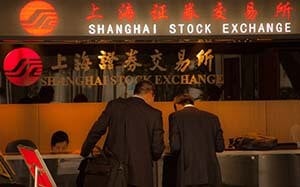The Chinese stock market suffered another punishing day Tuesday, prompting the country's central bank to cut interest rates hours after markets closed. The government also lowered the amount of cash banks are required to set aside in reserves.
 The Shanghai Composite Index ended Tuesday with a 7.6% decline. The index closed at 2,964.97, sinking below the 3,000 level for the first time since December. In the four days since Aug. 19, China's main stock benchmark has fallen 22%.
The Shanghai Composite Index ended Tuesday with a 7.6% decline. The index closed at 2,964.97, sinking below the 3,000 level for the first time since December. In the four days since Aug. 19, China's main stock benchmark has fallen 22%.
The smaller Shenzhen market tumbled 7.1% Tuesday. More than 700 stocks fell by the 10% daily limit in Shanghai today.
Tuesday's rout followed an 8.5% decline in Chinese stocks on Monday. That marked the worst one-day loss in more than eight years. The tightly regulated Chinese government media didn't hold back, describing the dismal day for Chinese investors as "Black Monday."
One-month losses for the Shanghai and Shenzhen now sit at 27.17% and 24.17%, respectively. The Shanghai index is down 45% from its mid-June peak, while the Shenzhen is down 47%. At their apex, Chinese stocks were up 60% for the year.
Shares in China had soared 150% from June 2014 to June 2015. The run was fueled by individual investors who often borrowed heavily to start investing.
Here's why the central bank moved to cut interest rates after another down day for the Chinese stock market...
Why Chinese Stock Market Crash Prompted Rate Cut
The People's Bank of China (PBOC) trimmed interest rates by 0.25% to 4.6% today. It also reduced banks' minimum reserve requirement by 0.5%, effective Sept. 6. The move will add roughly 678 billion yuan (about $105.7 billion) into the Chinese economy.
"The main goal of cutting rates is to support the healthy development of the real economy," the bank said in a statement.
Investors took the PBOC's action as a sign that Beijing is ready to take new measures to boost China's economy and provide a cushion for stocks.
The world's second-largest economy has shown signs of economic slowdown in 2015. The country is expected to grow at a 7% clip this year, the lowest rate in 25 years.
And signals have been flashing that it might not be able to reach that target. Last year's growth of 7.4% fell short of announced estimates of 7.5%. It was the first time the country missed a growth target since 2008. In recent years, China's economy had been growing at double digits rates.
Chinese stock markets had closed for the day when the PBOC announced its new market stimulus moves. So investors in China will have to wait until Wednesday to trade on the news.
The news did help contributed to a bounce in global stocks, however.
After a tumultuous Monday in which the Dow, S&P 500, and Nasdaq dropped 3.57%, 3.94%, and 3.82%, respectively, all three benchmarks surged Tuesday. In mid-afternoon trading Tuesday, the trio were higher by 2.22%, 2.17%, and 3.15%, respectively.
Markets across Europe also soared. The Stoxx Europe 600 ended Tuesday up a healthy 4.18%.
It's too early to call a bottom for stocks. But the PCOB's move and Tuesday's bounce in stocks suggest the sell-off was an overreaction.
Watch the video for an explanation of China's stock market crash, plus how investors can protect themselves – and even profit – from these events…
Stay informed on what's going on in the markets by following us on Twitter @moneymorning.
Protect Yourself from a Total Market Collapse: According to CIA Asymmetric Threat Advisor Jim Rickards, there are five "flashpoints" that signal the death of the U.S. dollar and a complete economic collapse in the United States. Here's how you can protect yourself, and your money, before it's too late...
Related Articles:
- Bloomberg: Asian Markets
- The Wall Street Journal: China's Central Bank Cuts Interest Rates
- The Washington Post: U.S. Stocks Rebound After Punishing Day, but China's Market Slides Again


